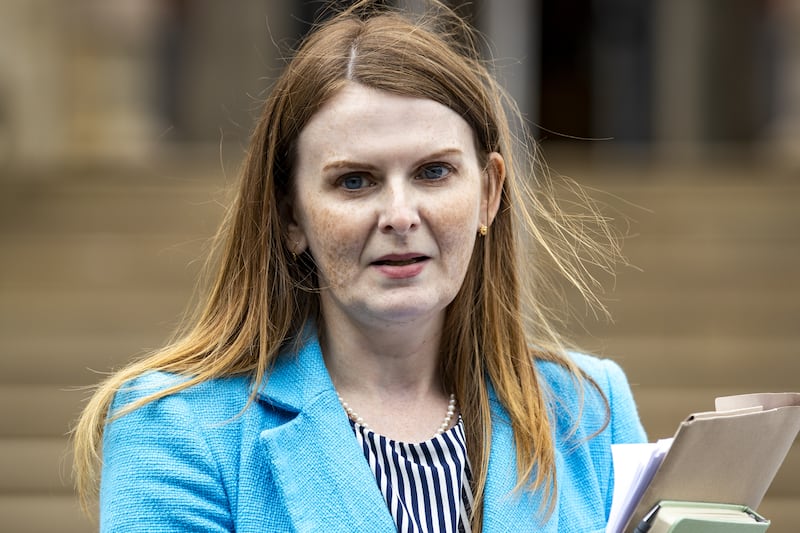The British government has confirmed details of the £3.3 billion funding package to support the restored powersharing administration at Stormont, including plans to deliver a balanced budget for 2024/25 that includes a minimum of £113 million raised through locally generated income.
The settlement has been outlined in a letter to Finance Minister Caoimhe Archibald.
The government described it as a “significant, fair and generous” package.
The letter was sent amid a simmering political row on whether the settlement is dependent on the devolved Executive introducing its own new revenue-raising measures.
First Minister Michelle O’Neill and deputy First Minister Emma Little-Pengelly have both raised concerns on the impact of new or hiked charges on hard-pressed families in the north.
On Monday, Ms O’Neill definitively ruled out the introduction of water charges as a tool to raise extra cash.
Ministers in Belfast will also be expected to publish a “comprehensive and costed” long-term strategic infrastructure plan that sets out priority areas for action and how they will support prosperity and growth.
Details on the financial package outlined in the letter to Stormont include:
- Reform of the Barnett formula for allocating Treasury funds to Northern Ireland, with funding rates for the region set at 24% above comparative rates in England. The Government said this would reflect the “different levels of need in Northern Ireland”.
- A £1 billion fund to stabilise Stormont’s public finances.
- £34 million to tackle spiralling hospital waiting lists.
- Flexibility to allow deferment of repayment of a multimillion-pound overspend of Treasury funding during the powersharing impasse.
- Funds to help meet public sector pay demands in the current financial year.
- Boost the Executive’s spending powers to transform public services by repurposing in excess of £700 million of existing and new British government funds.
- Increase the Executive’s annual capital borrowing limit by 10% in 2024/25, a limit which will then increase annually in line with inflation.
Secretary of State Chris Heaton-Harris said: “This package tackles the immediate budget pressures facing the restored Executive and allows it to take action to rapidly stabilise public services, while increasing opportunities for investment and improved infrastructure.
“It also paves the way for vital transformation of public services, and will deliver well-deserved pay awards for public sector workers.
“It is now for the Northern Ireland Executive to use this significant financial package to take forward the vital work of public service transformation and the commitment to deliver sustainable finances - ensuring better outcomes in the day-to-day lives of the people in Northern Ireland.”
Asked about localised revenue raising measures on Monday, Ms O’Neill insisted the onus should instead be on the British government to deliver a “proper funding model” for Northern Ireland.
She made clear the Executive would not be introducing water charges.
Water charging is not the only option open to ministers to raise extra cash for public services, but it is one of the more significant potential tools at their disposal.
Other options could see ministers hike rate bills paid by households in Northern Ireland, or cut universal concessions such as free prescriptions or public transport passes for people aged 60 and above.
MS O’Neill’s comments chimed with weekend remarks by DUP deputy First Minister Ms Little-Pengelly, who said it was unsustainable to ask people to pay more for “poor public services”.
Stormont’s Finance Minister Caoimhe Archibald has said she has “serious concerns” after the Treasury confirmed details and conditions of a £3.3 billion financial package to support the return of devolution in Northern Ireland.
Chief Secretary to the Treasury Laura Trott confirmed details of the settlement in a letter to Ms Archibald on Tuesday.
In her letter of response, Ms Archibald said: “I have serious concerns in relation to a number of areas outlined within your letter and would welcome engagement with you on this at the earliest opportunity.
“There is a clear public expectation the financial package will fully address public sector pay pressures.
“We welcome your agreement to the flexibility we requested to utilise the additional funding for general pressures towards the delivery of public sector pay deals.
“However, the reality is the current package does not meet this expectation nor provide a sustainable solution.”

Ms Archibald said a Treasury demand for the powersharing Executive to raise £113 million within the next 12 months would “cause more harm to hard-pressed families, households and businesses”.
In her response to Ms Trott the Sinn Féin MLA said: “Ministers are united and speak with one voice in the need to invest and reform our public services.
“Making the write-off of the £559 million for debt repayment conditional on the publication and implementation of a sustainability plan is not acceptable. It is our strong view that these debts exist primarily due to the underfunding of public services.
“The Executive has already given a commitment to the British Government to develop a Sustainability Plan with a pre-requisite that the right level of funding is provided.
“The Government’s timescale requiring this to be published by May 2024 is completely unrealistic.
“It is essential that the Executive is afforded adequate time to give proper consideration to this important matter.
“To expect this funding to be generated in such a short space of time can only serve to cause more harm to hard pressed families, households and businesses. Our message to Westminster is simple.
“The Executive should be given time and space to develop and agree a properly thought through Sustainability Plan that will put our finances on a more stabilised footing.
“It is critical we have the right resources to deliver effective public services for all our citizens. We ask that the British Government act in good faith.
“There can be no further damage to our public services.”


